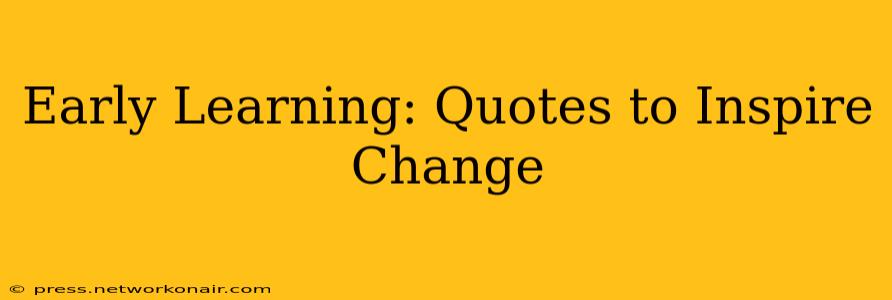Early learning sets the stage for a child's entire life. The experiences, relationships, and foundational knowledge gained during these crucial formative years profoundly impact their future academic success, social-emotional well-being, and overall life trajectory. This makes investing in high-quality early learning programs not just a societal benefit, but a moral imperative. To further underscore the importance of early childhood education, let's explore some inspiring quotes and delve into the significance of each.
What is the importance of early childhood education?
Early childhood education (ECE) is crucial because it lays the groundwork for a child's cognitive, social, emotional, and physical development. High-quality ECE programs provide a nurturing and stimulating environment that fosters language development, literacy skills, numeracy, problem-solving abilities, and social-emotional competencies. These skills aren't just important for school readiness; they are essential for success in all aspects of life. Children who participate in quality early learning programs are more likely to:
- Perform better academically: Research consistently shows a strong correlation between early childhood education and later academic achievement. These children tend to have higher test scores, graduate at higher rates, and pursue higher education.
- Develop stronger social-emotional skills: Early learning environments provide opportunities for children to learn how to interact with others, manage their emotions, resolve conflicts peacefully, and build healthy relationships.
- Improve their physical health: Many ECE programs incorporate physical activity and healthy eating habits into their curriculum, contributing to the children's physical well-being.
- Reduce the achievement gap: High-quality ECE programs can help close the achievement gap between children from different socioeconomic backgrounds by providing all children with access to the same enriching learning opportunities.
What are some of the benefits of early childhood education?
The benefits of early childhood education extend far beyond simply preparing children for kindergarten. They encompass long-term impacts on individual well-being, societal progress, and economic prosperity. Studies have shown that investing in early childhood education yields a significant return on investment, both in terms of individual outcomes and societal gains. These benefits include:
- Increased earning potential: Individuals who participated in high-quality early childhood education programs are more likely to have higher-paying jobs and experience greater economic stability throughout their lives.
- Reduced crime rates: Early intervention programs can help reduce the likelihood of future involvement in criminal activity.
- Improved overall health: Early learning fosters healthy habits and promotes overall well-being, leading to better physical and mental health outcomes in adulthood.
- Stronger communities: Early childhood education contributes to the development of stronger, more resilient communities by fostering social-emotional skills and promoting positive social interactions.
How does early childhood education affect brain development?
The early years are a period of rapid brain development. The brain is incredibly malleable during this time, and experiences significantly shape its structure and function. High-quality early childhood education provides the optimal environment for brain development, fostering the growth of neural connections and enhancing cognitive abilities. This period is often referred to as a "sensitive period" for learning, highlighting the unique opportunity for maximizing brain potential during these formative years. Exposure to stimulating activities, positive interactions, and enriching learning opportunities during this time contributes to the development of critical thinking, problem-solving skills, and overall cognitive flexibility.
What are some examples of good early childhood education programs?
There's a wide range of early childhood education programs available, each with its own unique approach and focus. Some popular examples include Montessori schools, Reggio Emilia-inspired programs, and play-based learning programs. The effectiveness of a program hinges on several key factors:
- Qualified teachers: Experienced and well-trained educators are essential for providing high-quality instruction and creating a supportive learning environment.
- Curriculum: A well-designed curriculum that is developmentally appropriate and engaging is crucial for promoting learning and development.
- Resources and materials: Access to quality resources and materials is essential for creating an enriching learning experience.
- Low child-to-teacher ratios: Smaller class sizes allow for more individualized attention and support for each child.
- Supportive environment: A nurturing and safe environment fosters emotional security and allows children to thrive.
Choosing the right program depends on individual needs and preferences, but prioritizing the key elements mentioned above is crucial for selecting a high-quality early childhood education experience.
What are some inspiring quotes about early childhood education?
To conclude, let's look at quotes that eloquently capture the essence of early childhood education's profound impact:
"If we work on the child, we work for the future." – Maria Montessori
This quote highlights the far-reaching consequences of nurturing young minds. Investing in early childhood education is an investment in the future, shaping not just individual lives but the course of society itself.
"The greatest thing you'll ever learn is just to love and be loved in return." – Natalie Cole (While not explicitly about ECE, it speaks to the crucial role of nurturing relationships in early learning). Positive relationships between children and caregivers are foundational to healthy emotional development.
"Tell me and I forget, teach me and I may remember, involve me and I learn." – Benjamin Franklin
This quote underscores the importance of active learning and engagement in early childhood education. Effective teaching methods involve children actively, making learning a hands-on, meaningful experience.
Investing in quality early learning is not merely an educational endeavor; it's a societal investment yielding immeasurable returns. The quotes above serve as a powerful reminder of the transformative power of early experiences and the enduring legacy of providing children with the best possible start in life.

